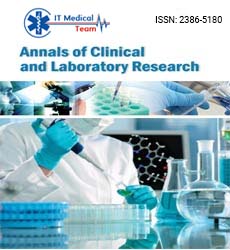Short Communication - (2023) Volume 11, Issue 6
Revolutionizing Drug Discovery: The Role of Artificial Intelligence in Pharmaceutical Research
Rachel Addis*
Department of Pharmacology, Georgetown University, USA
*Correspondence:
Rachel Addis, Department of Pharmacology, Georgetown University,
USA,
Email:
Received: 01-Nov-2023
Published:
27-Nov-2023, DOI: 10.36648/2386-5180.23.11.496
Introduction
In the realm of pharmaceutical research, the integration of
artificial intelligence (AI) has ushered in a new era, redefining
the way scientists discover and develop drugs. Traditional
drug discovery processes are not only time-consuming but
also incredibly expensive, often requiring years of painstaking
research and a substantial financial investment. Enter artificial
intelligence, a technological marvel that holds the promise
of revolutionizing the field by accelerating the drug discovery
process, reducing costs, and increasing the likelihood of finding
novel therapeutic solutions [1,2].
Accelerating Drug Discovery with AI: Artificial intelligence,
particularly machine learning algorithms, excels at analyzing
vast amounts of data, a task that would be daunting for human
researchers. In pharmaceutical research, AI sifts through
massive datasets encompassing genetic information, chemical
properties, and clinical trial results. By identifying intricate
patterns and correlations within these datasets, AI algorithms
can pinpoint potential drug candidates and predict their efficacy.
This analytical prowess significantly expedites the initial stages of
drug discovery, allowing researchers to focus their efforts on the
most promising compounds [3-5].
Target Identification and Drug Repurposing: One of the significant
contributions of AI in drug discovery is the identification of
potential drug targets. By analyzing biological data, AI algorithms
can identify specific proteins, genes, or pathways associated
with diseases. This information is invaluable for researchers,
enabling them to develop drugs that target these precise
biological markers. Additionally, AI facilitates drug repurposing
– the process of finding new uses for existing drugs. By analyzing
vast databases of drug interactions and molecular structures, AI
algorithms can identify existing drugs that might be effective in
treating different diseases. This approach not only saves time but
also repurposes drugs, making healthcare more cost-effective
and accessible [6,7].
Virtual Drug Screening and Design: AI-powered virtual screening
techniques are another game-changer in the field of drug
discovery. Instead of physically testing thousands of compounds
in a laboratory, researchers can use AI algorithms to simulate interactions between drugs and target molecules. These
simulations provide valuable insights into the effectiveness
and safety of potential drug candidates. Moreover, AI can aid
in designing novel drug molecules with specific properties. By
generating and evaluating numerous molecular structures, AI
accelerates the process of finding compounds with optimal
therapeutic effects and minimal side effects [8].
Clinical Trial Optimization: Clinical trials are pivotal in
determining the safety and efficacy of new drugs. AI optimizes
this phase of drug development by analyzing diverse patient
data, identifying suitable candidates, and predicting patient
responses. AI algorithms can analyze a patient's genetic makeup,
lifestyle factors, and medical history to personalize treatments,
ensuring a higher likelihood of positive outcomes. Furthermore,
AI enhances the recruitment process for clinical trials, identifying
eligible participants faster and more efficiently than traditional
methods [9].
Challenges and Ethical Considerations: While the potential
of AI in pharmaceutical research is immense, it is not without
challenges. Ensuring the accuracy and reliability of AI algorithms
is crucial, as errors in predictions can have serious consequences.
Ethical considerations, such as data privacy and algorithm
bias, also need careful attention. Striking a balance between
innovation and ethical practices is essential to harness the full
potential of AI in drug discovery [10].
Conclusion
In conclusion, the integration of artificial intelligence in pharmaceutical research represents a transformative leap
forward. By expediting drug discovery, identifying novel targets,
facilitating drug repurposing, enabling virtual screening, and
optimizing clinical trials, AI is revolutionizing the way we develop
new medicines. As technology continues to advance, the
collaboration between human expertise and artificial intelligence
holds the key to unlocking innovative solutions for some of the
most challenging diseases humanity faces, ushering in a future
where healthcare is not only more efficient but also more
personalized and accessible for all.
References
- Tiwari PC, Pal R, Chaudhary MJ, Nath R (2023). Artificial intelligence revolutionizing drug development: Exploring opportunities and challenges. Drug Dev Res.
Indexed at, Google Scholar, Cross Ref
- Siddiq M (2022). Revolutionizing Drug Discovery; Transformative Role of Machine Learning. BULLET: Jurnal Multidisiplin Ilmu. 1(02):162-70.
Google Scholar
- Paul D, Sanap G, Shenoy S, Kalyane D, Kalia K (2021). Artificial intelligence in drug discovery and development. Drug Discov Today. 26(1):80.
Indexed at, Google Scholar, Cross Ref
- Boniolo F, Dorigatti E, Ohnmacht AJ, Saur D, Schubert B (2021). Artificial intelligence in early drug discovery enabling precision medicine. Expert Opin Drug Discov. 16(9):991-1007.
Indexed at, Google Scholar, Cross Ref
- Mak KK, Pichika MR (2019). Artificial intelligence in drug development: present status and future prospects. Drug Discov Today. 24(3):773-80.
Indexed at, Google Scholar, Cross Ref
- Husnain A, Rasool S, Saeed A, Hussain HK (2023). Revolutionizing Pharmaceutical Research: Harnessing Machine Learning for a Paradigm Shift in Drug Discovery. Int j multidiscip sci. engineer. 2(2):149-57.
Indexed at, Google Scholar, Cross Ref
- Malandraki-Miller S, Riley PR (2021). Use of artificial intelligence to enhance phenotypic drug discovery. Drug Discov Today. 26(4):887-901.
Indexed at, Google Scholar, Cross Ref
- Patel V, Shah M (2022). Artificial intelligence and machine learning in drug discovery and development. Intell Med. 2(3):134-40.
Indexed at, Google Scholar, Cross Ref
- Han R, Yoon H, Kim G, Lee H, Lee Y (2023). Revolutionizing Medicinal Chemistry: The Application of Artificial Intelligence (AI) in Early Drug Discovery. Pharm. 16(9):1259.
Indexed at, Google Scholar, Cross Ref
- Pendy B (2023). Revolutionizing Pharmaceutical Research: Harnessing Machine Learning for a Paradigm Shift in Medicine Discovery. BULLET: Jurnal Multidisiplin Ilmu. 2(4):1267-75.
Google Scholar
Citation: Addis R (2023) Revolutionizing Drug Discovery: The Role of Artificial Intelligence in Pharmaceutical Research. Ann Clin Lab Res. Vol.11 No.6:496






